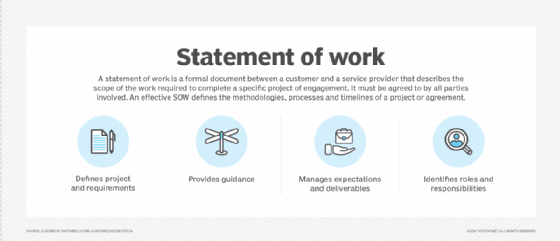statement of work (SOW)
A statement of work (SOW), in project management, is a document in which a contracting officer or chief procurement officer (CPO) specifies the objectives and deliverables for a particular project or service contract. An SOW is often included as part of a request for proposal (RFP), a document used to solicit sealed bids from potential vendors and service providers.
Prospective service providers use the information a SOW provides to determine whether or not they can meet the objectives and deliverables for a particular project or service contract and would like to submit a proposal. A well-defined statement of work reduces the risk of misunderstanding or miscommunication. It also provides talking points that will help the customer and contractor eventually enter into a formal and legally binding agreement, based upon realistic expectations and outcomes, should they decide to work together. A statement of work is legally binding, but it is not the final, formal contract signed at the end of the contracting process. It can be thought of as the formal foundation of a final contract.
Benefits of using a statement of work
Statements of work are best suited for internal and external projects that are too complex for a work breakdown structure (WBS). A few benefits to using an SOW over alternatives include:
- They are legally binding and pre-approved by the client, meaning the project is fully supported by all parties.
- They provide transparency into methods and processes for the project stakeholders.
- They reduce any confusion that may arise during a project.
- They unite teams that may not work together directly, but all play a role in a project.
- They help streamline the planning process for large, complex projects.

What is included in a statement of work document?
The format for a statement of work in project management can vary, but they all tend to follow a basic template and have a reasonably consistent set of characteristics. These include:
- Background: This section of a statement of work explains the context for the project and documents the project's overarching goals and requirements. It explicitly states what business needs are addressed by carrying out the project.
- Purpose/objectives: This section states the project's overarching goals and how they will solve business problems or positively affect different parts of the organization.
- Scope of work: This section of an SOW documents what work will be performed under a contractual agreement, how the work will be divided and who is responsible for completing the work. The project scope also addresses what resources are required for the project, taking budget into consideration.
- Tasking and deliverables: This section defines the specific tasks or deliverables the contractor must perform, along with a timeline for work to be completed. Each process is broken down by task and resources before being assigned to specific team members.
- Standards and testing: This section outlines any industry or compliance standards that must be met when executing the project, as well as any testing that needs to be done.
- Acceptance criteria: This section specifies how the customer will determine whether the contractor or service provider can meet the objectives of project tasks and deliverables, and whether their product or service is deemed acceptable.
- Payment: This section documents how and when completed work will be invoiced and when payment will be scheduled. Billing hours may also be addressed in this section.
Additionally, an SOW may list any special requirements needed, such as specialized hardware or software, technical skills or certifications, and security requirements, such as security clearance. If applicable, the document will also specify project location and travel needs.
Different industry standards may require different overall SOW styles and formats. For example, a public institution likely has different industry requirements than a private one, and therefore a different SOW format type may be preferable over another.
Best practices for writing a statement of work
A statement of work document can become complicated and time-consuming, and due to its legal weight, it is important to keep from making mistakes or being ambiguous. Suggestions for writing an effective SOW include:
- Use short, succinct sentences.
- Include a glossary in the background section. Explain how acronyms and terms will be used in the SOW.
- Spell out acronyms the first time they are used.
- Avoid industry jargon.
- Use words consistently. For example, use the same verb to describe the same action throughout the document.
- Use binding noun-verb combinations, such as "the contractor will" or "the procurement manager shall."
- Avoid phrases that can be open to interpretation, such as etc.
- Provide enough detail to make expectations clear, but not so many details that they create potential bottlenecks.
- Schedule times for formal reviews and testing to keep the project on track.
- Include visuals, such as charts or graphs that may help clarify the project further.
Types of statement of work documents
A statement of work document is typically categorized by its business case. There are three common types of SOW documents.
- Design/detail. This model of SOW focuses on the details behind the project requirements and processes. Detailed requirements range from quality levels to amount of resources to materials. The client specifically defines how the project should be done for the supplier to follow explicitly.
- Level of effort/time and materials/unit rate. This is the most common version of the SOW that is typically used as a template for most projects. It breaks down specific tasks by materials and services needed as well as the timeline to complete them.
- This type of SOW is performance-based and emphasizes end results of the project over process details. Process details are specified in this type, but they are framed by end results, not strict detail guidelines.
SOWs and government procurement
In the United States, the government procurement process was once highly prescriptive, and statements of work were extremely detailed. In the 1990s, the Government Performance and Results Act and the Clinger-Cohen Act were passed to encourage government agencies to switch to performance-based contracts, which emphasized business outcomes and results instead of providing detail for how work must be done.
Consequently, statements of work in government procurement have become more achievement-oriented and less driven by detailed specifications. One specific example of this pattern is a performance work statement, an SOW variant that the General Services Administration describes as emphasizing desired service outcomes and performance standards. Another variant is the level of effort SOW, which shifts the emphasis away from how work should be done, to what resources are required to get the work done. These variants are defined in the "Types of statement of work documents" section above.
Statement of work in freelance contracts
In a freelance contract, a statement of work may be used to document work the contractor has agreed to complete during a specific time period. A statement of work may serve as a written follow-up to a verbal agreement, and in this context, may also be referred to as an assignment letter. Typically, this type of SOW is legally binding because it is supported by another, more comprehensive contractual document, such as a writer's agreement, consulting agreement or design services agreement.
Statement of work vs. scope of work
A statement of work can often be confused with the scope of work, as both use the same acronym of SOW. However, the scope of work is just one section that should be included in a statement of work document. The entire document focuses on the comprehensive details of the project, while the scope only addresses how goals will be met and who will be affected. Defining the scope statement up front keeps the project from growing in unexpected, unnecessary ways.






